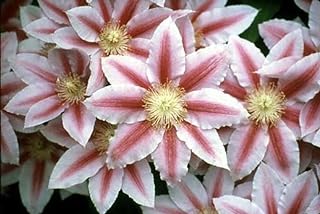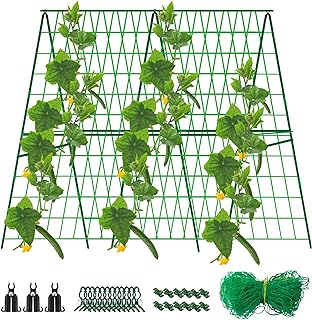5 important factors worth considering when looking for the best cucumber fertilizer
When you’re picking out fertilizer for your cucumber plants, there are a few important things to think about. These factors can affect how well your plants grow, how healthy they are, and how much they produce. You need to consider what nutrients cucumbers need, check the quality of your soil, and think about the environment where your plants are growing. This information will help you choose the right fertilizer, which is important for getting the most cucumbers of the best quality. By looking closely at these factors, you can make sure your cucumbers have everything they need to grow well. This will set the stage for a successful harvest.
See our guide to the best cucumber fertilizer.
Nutrient content (NPK ratio)
When choosing the best fertilizer for cucumbers, the NPK ratio is important. This ratio ensures your plants get the right nutrients for strong growth and good harvests. Nitrogen helps with leafy green growth, which is important for photosynthesis. Phosphorus helps roots grow strong and absorb water and nutrients. Potassium is important for disease resistance and fruit quality. A balanced NPK ratio is key for healthy cucumber plants and good harvests.
Knowing about the NPK ratio when choosing fertilizer for cucumbers can really help your garden. Look at the NPK numbers on fertilizers to make sure they match what your plants need at different stages of growth. Investing in a quality fertilizer with the right NPK ratio for cucumbers can make a big difference in your garden’s health and productivity. By focusing on the nutrients in your fertilizer, you can have a successful cucumber garden that gives you plenty of tasty cucumbers to enjoy and share each season.
Slow-release vs. quick-release
When it comes to gardening, choosing between slow-release and quick-release fertilizers for cucumbers is an important decision that can greatly impact the health of your plants. Quick-release fertilizers provide nutrients right away, leading to fast growth, but they don’t last long. On the other hand, slow-release fertilizers release nutrients slowly over time, providing a more sustainable way to nourish your cucumbers.
Even though quick fixes might seem appealing, using a slow-release fertilizer for cucumbers is a wise investment in the health of your garden. By giving your plants a steady supply of nutrients, slow-release fertilizers help with root growth, vine strength, and a bountiful cucumber harvest. While quick-release fertilizers offer immediate results, the long-lasting benefits of choosing slow-release fertilizers for cucumbers are worth it in the end.
In the world of cucumber growing, taking a patient approach with slow-release fertilizers is key to having a thriving garden. Instead of focusing on quick gains, prioritizing sustained nourishment will lead to a successful cucumber crop and a healthy garden environment.
Organic vs. synthetic
When deciding between organic and synthetic fertilizers for cucumbers, it’s important to consider more than just the immediate effects. Synthetic fertilizers can give a quick nutrient boost, but they can also harm the environment. Chemical runoff from synthetic fertilizers can pollute water and damage ecosystems over time, threatening biodiversity. On the other hand, organic fertilizers are made from natural sources, which promote soil health and create a sustainable growing environment. Choosing organic fertilizers not only provides nutrients to your cucumbers, but also helps maintain a balanced relationship with nature.
The benefits of organic fertilizers reach beyond your cucumber patch, impacting the entire food chain. Supporting organic practices helps maintain soil fertility and reduces reliance on synthetic inputs. Using synthetic fertilizers, however, perpetuates a system dependent on chemicals and artificial enhancements. When choosing between organic and synthetic fertilizers for cucumbers, it’s more than just a buying decision—it reflects your values and commitment to creating a healthier, more balanced ecosystem for future generations.
PH level compatibility
When you’re looking for the best fertilizer for cucumbers, it’s important to understand pH levels. Cucumbers do well in soil that is slightly acidic to neutral, with a pH between 6.0 and 7.0. This helps them take in nutrients they need to grow well and produce lots of fruit. Not paying attention to pH levels when choosing fertilizer could hurt how well your cucumbers grow.
Using a fertilizer made for the type of pH cucumbers like can really help them grow better. Keeping the pH in the right range helps cucumbers soak up nutrients efficiently, leading to strong plants and a big harvest. Even though it might seem like a small detail, picking a fertilizer with the right pH level can make a big difference in how well your cucumber garden does. By focusing on this, you show that you’re dedicated to giving your cucumbers the perfect conditions they need to do well, which will lead to a successful garden and a more satisfying gardening experience.
Water-solubility
When looking for fertilizer for your cucumbers, it’s important to consider how well it dissolves in water. This is important because it helps the plants take in nutrients effectively. Choosing a fertilizer that dissolves in water not only makes it easier to apply, but also helps the plants absorb the nutrients they need. This leads to healthier, stronger cucumber plants that can better handle tough conditions and produce a lot of cucumbers.
Water-soluble fertilizers for cucumbers also allow gardeners to control the amount of nutrients they give to their plants. This means they can adjust feeding schedules to meet the plants’ specific needs. This helps the cucumbers grow well and stay healthy. While it may seem like a small detail, investing in a high-quality water-soluble fertilizer can make a big difference in how well your cucumber plants grow. By choosing a fertilizer that dissolves in water, you are setting your cucumber garden up for success and a great harvest all season long.
Conclusion
When growing cucumbers, it’s important to pick the right fertilizer. Good nutrition is key for a big harvest, and each nutrient helps the plant grow. Organic fertilizers with nitrogen, phosphorus, and potassium can keep plants healthy and soil in good shape. Choosing the right fertilizer leads to a successful cucumber crop that tastes good and is good for us. Want more info on yoyos, check the best yoyos.



